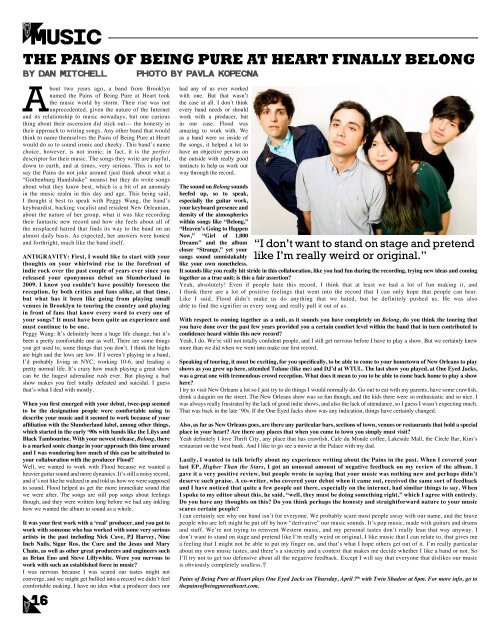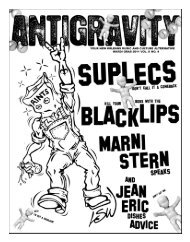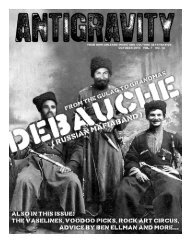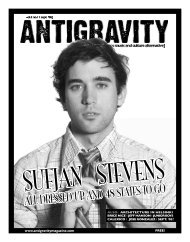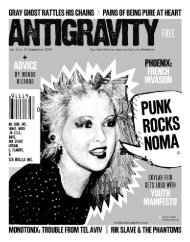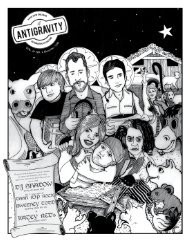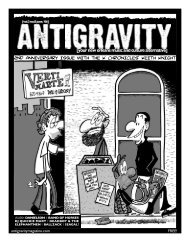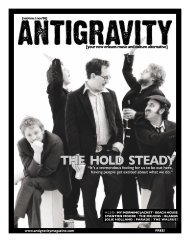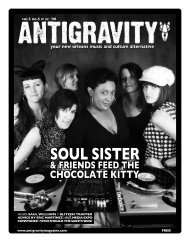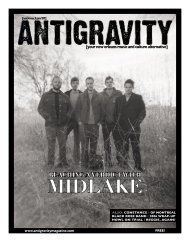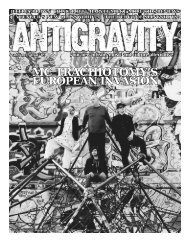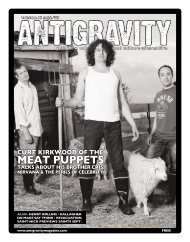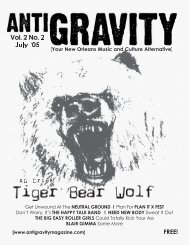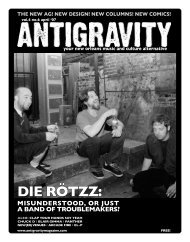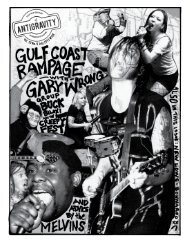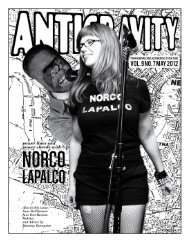April 2011 (PDF) - Antigravity Magazine
April 2011 (PDF) - Antigravity Magazine
April 2011 (PDF) - Antigravity Magazine
You also want an ePaper? Increase the reach of your titles
YUMPU automatically turns print PDFs into web optimized ePapers that Google loves.
MUSIC<br />
THE PAINS OF BEING PURE AT HEART FINALLY BELONG<br />
BY DAN MITCHELL PHOTO BY PAVLA KOPECNA<br />
About two years ago, a band from Brooklyn<br />
named the Pains of Being Pure at Heart took<br />
the music world by storm. Their rise was not<br />
unprecedented, given the nature of the Internet<br />
and its relationship to music nowadays, but one curious<br />
thing about their ascension did stick out--- the honesty in<br />
their approach to writing songs. Any other band that would<br />
think to name themselves the Pains of Being Pure at Heart<br />
would do so to sound ironic and cheeky. This band’s name<br />
choice, however, is not ironic; in fact, it is the perfect<br />
descriptor for their music. The songs they write are playful,<br />
down to earth, and at times, very serious. This is not to<br />
say the Pains do not joke around (just think about what a<br />
“Gothenburg Handshake” means) but they do write songs<br />
about what they know best, which is a bit of an anomaly<br />
in the music realm in this day and age. This being said,<br />
I thought it best to speak with Peggy Wang, the band’s<br />
keyboardist, backing vocalist and resident New Orleanian,<br />
about the nature of her group, what it was like recording<br />
their fantastic new record and how she feels about all of<br />
the misplaced hatred that finds its way to the band on an<br />
almost daily basis. As expected, her answers were honest<br />
and forthright, much like the band itself.<br />
ANTIGRAVITY: First, I would like to start with your<br />
thoughts on your whirlwind rise to the forefront of<br />
indie rock over the past couple of years ever since you<br />
released your eponymous debut on Slumberland in<br />
2009. I know you couldn’t have possibly foreseen the<br />
reception, by both critics and fans alike, at that time,<br />
but what has it been like going from playing small<br />
venues in Brooklyn to touring the country and playing<br />
in front of fans that know every word to every one of<br />
your songs? It must have been quite an experience and<br />
must continue to be one.<br />
Peggy Wang: It’s definitely been a huge life change, but it’s<br />
been a pretty comfortable one as well. There are some things<br />
you get used to, some things that you don’t. I think the highs<br />
are high and the lows are low. If I weren’t playing in a band,<br />
I’d probably living in NYC, working 10-6, and leading a<br />
pretty normal life. It’s crazy how much playing a great show<br />
can be the hugest adrenaline rush ever. But playing a bad<br />
show makes you feel totally defeated and suicidal. I guess<br />
that’s what I deal with mostly.<br />
When you first emerged with your debut, twee-pop seemed<br />
to be the designation people were comfortable using to<br />
describe your music and it seemed to work because of your<br />
affiliation with the Slumberland label, among other things,<br />
which started in the early ‘90s with bands like the Lilys and<br />
Black Tambourine. With your newest release, Belong, there<br />
is a marked sonic change in your approach this time around<br />
and I was wondering how much of this can be attributed to<br />
your collaboration with the producer Flood?<br />
Well, we wanted to work with Flood because we wanted a<br />
heavier guitar sound and more dynamics. It’s still a noisy record,<br />
and it’s not like he waltzed in and told us how we were supposed<br />
to sound. Flood helped us get the more immediate sound that<br />
we were after. The songs are still pop songs about feelings<br />
though, and they were written long before we had any inkling<br />
how we wanted the album to sound as a whole.<br />
It was your first work with a ‘real’ producer, and you got to<br />
work with someone who has worked with some very serious<br />
artists in the past including Nick Cave, PJ Harvey, Nine<br />
Inch Nails, Sigur Ros, the Cure and the Jesus and Mary<br />
Chain, as well as other great producers and engineers such<br />
as Brian Eno and Steve Lillywhite. Were you nervous to<br />
work with such an established force in music?<br />
I was nervous because I was scared our tastes might not<br />
converge, and we might get bullied into a record we didn’t feel<br />
comfortable making. I have no idea what a producer does nor<br />
16<br />
had any of us ever worked<br />
with one. But that wasn’t<br />
the case at all. I don’t think<br />
every band needs or should<br />
work with a producer, but<br />
in our case, Flood was<br />
amazing to work with. We<br />
as a band were so inside of<br />
the songs, it helped a lot to<br />
have an objective person on<br />
the outside with really good<br />
instincts to help us work our<br />
way through the record.<br />
The sound on Belong sounds<br />
beefed up, so to speak,<br />
especially the guitar work,<br />
your keyboard presence and<br />
density of the atmospherics<br />
within songs like “Belong,”<br />
“Heaven’s Going to Happen<br />
Now,” “Girl of 1,000<br />
Dreams” and the album<br />
closer “Strange,” yet your<br />
songs sound unmistakably<br />
like your own nonetheless.<br />
“I don’t want to stand on stage and pretend<br />
like I’m really weird or original.”<br />
It sounds like you really hit stride in this collaboration, like you had fun during the recording, trying new ideas and coming<br />
together as a true unit; is this a fair assertion?<br />
Yeah, absolutely! Even if people hate this record, I think that at least we had a lot of fun making it, and<br />
I think there are a lot of positive feelings that went into the record that I can only hope that people can hear.<br />
Like I said, Flood didn’t make us do anything that we hated, but he definitely pushed us. He was also<br />
able to find the signifier in every song and really pull it out of us.<br />
With respect to coming together as a unit, as it sounds you have completely on Belong, do you think the touring that<br />
you have done over the past few years provided you a certain comfort level within the band that in turn contributed to<br />
confidence heard within this new record?<br />
Yeah, I do. We’re still not totally confident people, and I still get nervous before I have to play a show. But we certainly knew<br />
more than we did when we went into make our first record.<br />
Speaking of touring, it must be exciting, for you specifically, to be able to come to your hometown of New Orleans to play<br />
shows as you grew up here, attended Tulane (like me) and DJ’d at WTUL. The last show you played, at One Eyed Jacks,<br />
was a great one with tremendous crowd reception. What does it mean to you to be able to come back home to play a show<br />
here?<br />
I try to visit New Orleans a lot so I just try to do things I would normally do. Go out to eat with my parents, have some crawfish,<br />
drink a daiquiri on the street. The New Orleans show was so fun though, and the kids there were so enthusiastic and so nice. I<br />
was always really frustrated by the lack of good indie shows, and also the lack of attendance, so I guess I wasn’t expecting much.<br />
That was back in the late ‘90s. If the One Eyed Jacks show was any indication, things have certainly changed.<br />
Also, as far as New Orleans goes, are there any particular bars, sections of town, venues or restaurants that hold a special<br />
place in your heart? Are there any places that when you come to town you simply must visit?<br />
Yeah definitely I love Thrift City, any place that has crawfish, Cafe du Monde coffee, Lakeside Mall, the Circle Bar, Kim’s<br />
restaurant on the west bank. And I like to go see a movie at the Palace with my dad.<br />
Lastly, I wanted to talk briefly about my experience writing about the Pains in the past. When I covered your<br />
last EP, Higher Than the Stars, I got an unusual amount of negative feedback on my review of the album. I<br />
gave it a very positive review, but people wrote in saying that your music was nothing new and perhaps didn’t<br />
deserve such praise. A co-writer, who covered your debut when it came out, received the same sort of feedback<br />
and I have noticed that quite a few people out there, especially on the internet, had similar things to say. When<br />
I spoke to my editor about this, he said, “well, they must be doing something right,” which I agree with entirely.<br />
Do you have any thoughts on this? Do you think perhaps the honesty and straightforward nature to your music<br />
scares certain people?<br />
I can certainly see why our band isn’t for everyone. We probably scare most people away with our name, and the brave<br />
people who are left might be put off by how “derivative” our music sounds. It’s pop music, made with guitars and drums<br />
and stuff. We’re not trying to reinvent Western music, and my personal tastes don’t really lean that way anyway. I<br />
don’t want to stand on stage and pretend like I’m really weird or original. I like music that I can relate to, that gives me<br />
a feeling that I might not be able to put my finger on, and that’s what I hope others get out of it. I’m really particular<br />
about my own music tastes, and there’s a sincerity and a context that makes me decide whether I like a band or not. So<br />
I’ll try not to get too defensive about all the negative feedback. Except I will say that everyone that dislikes our music<br />
is obviously completely soulless.<br />
Pains of Being Pure at Heart plays One Eyed Jacks on Thursday, <strong>April</strong> 7 th with Twin Shadow at 8pm. For more info, go to<br />
thepainsofbeingpureatheart.com.


